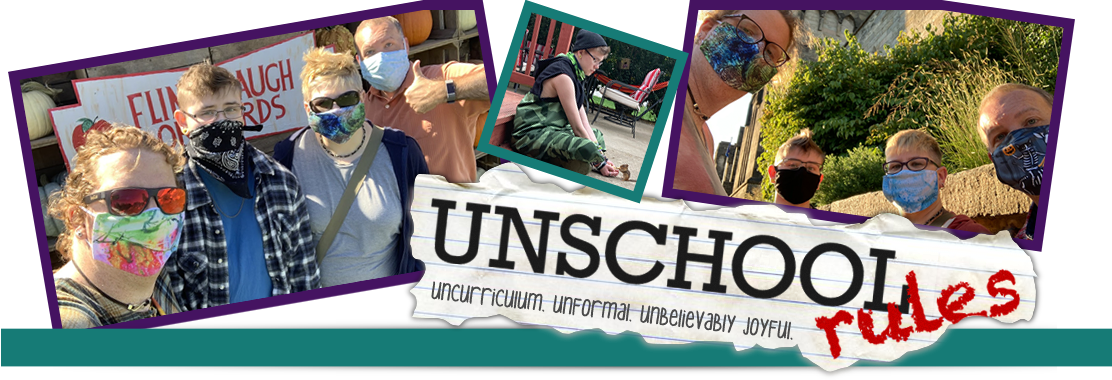October was awesome. Art. Traveling. Animals. Fun. Movies. Deep conversations. Forensics. Oh, and I got a promotion at work. Pretty good stuff; here’s a look at the highlights!

Ashar in the corn maze!
(If this is your first time catching our month-in-review posts, welcome! Check out our archive of previous wrapups here for some more info on why we take this approach to documenting some of our unschooling learning adventures.)
Books
- The Matrix and Philosophy. Ashar is on the next-to-last chapter of this super-dense book, and has really had some amazing conversations as a result. But she is so devoted to finishing it that she hasn’t wanted to read much else, which is totally fine by me!
- National Geographic. The November issue has a feature on “real zombies,” animals that take over their hosts, and Ashar loved it.

A “garden-variety” selfie in the butterfly garden at Reptiland.
Movies and TV
- Brick Mansions (parkour = win)
- Robin Hood: Men in Tights
- Oklahoma (the Hugh Jackman version)
- Defiance (once again showing that Ashar’s interest in and knowledge of World War II FAR exceeds mine)
- Casino Royale
- Skyfall
- Edge of Tomorrow
- The Goonies
- Mrs. Doubtfire
- Robots
- Star Trek: Voyager

Ashar laughing as a dinosaur at Reptiland sprayed her with water.
Video games
- Club Penguin
- L.A. Noire
- Fibbage
- NBA 2K14
- Just Dance Now
- FIFA Soccer 13
- Skate 3

Ashar made these candy acorns for my mom’s church’s bake sale.
Videos
Places and projects
- Our Words of the Day project – Ashar’s still creating a new word-of-the-day poster for our fridge on everything from the kingfisher to the ouroboros to the FBI
- Clyde Peeling’s Reptiland, Ashar’s second trip but my first
- Revisiting our timeline – We cleared it off and have started over with everything from the birth of Hitler to dates of various wars and more
- Forensics class at York College – Ashar signed up for a community education class on forensics, met a police detective, staffers from the District Attorney’s office, the deputy coroner and more
- Pennsylvania Renaissance Faire
- Dover Band Show – This is the marching band show held for local non-competition bands at my alma mater, and it was amazing
- DreamWrights production of The Hobbit musical – We had several friends in this show and super-much enjoyed seeing it and them
- Corn maze at Flinchbaugh’s Orchards (Chris took Ashar to this, and they also bought some fall decorations for our yard)
- A Haunted Bookshop Halloween at The York Emporium, our local favorite used-bookhouse and what I think might become a Halloween tradition for us

Ashar with a pirate ship at the Pennsylvania Renaissance Faire

Ashar decided she wanted to dress up as a “gangster bandit,” and so she did. And we hung out at our favorite bookstore with friends. Very cool.
Odds and ends of stuff we’ve talked about/read/geeked out over
- “I am a Stalwart of the Stalwarts and Arthur is president” and more about the assassination of James Garfield by Charles Guiteau.
- What the difference is between a personal reference and a professional one.
- The Google Made With Code project, where Ashar made a Yeti dance, a layered eye and more.
- How to (try to) salvage an iPod Touch that’s been through the wash, and how to deal with it when you can’t. (Ugh.)
- Making candy “acorns” out of Hershey’s Kisses, mini Nilla Wafers and chocolate chips.
- MAJOR ART COOLNESS: Ashar and I both had a piece accepted for a November show at The Parliament, a gallery in York, and we just dropped those off; later in November, we’ll both have a piece in a juried show at the York Art Association. Details on both of these to come!

Ashar and Chris being scared – uh, not really – by a Reptiland dino.
So what’s new with your family this month? Drop me a comment! I love hearing from all my “blog friends!”



